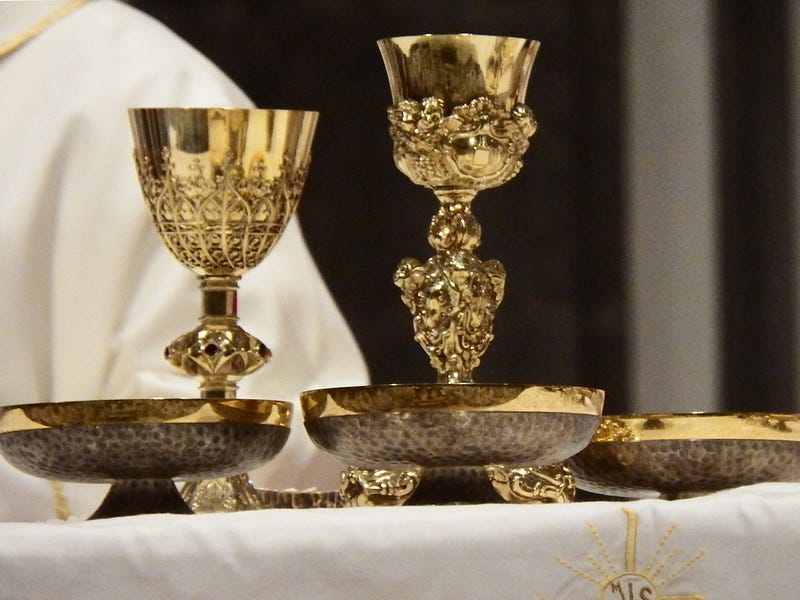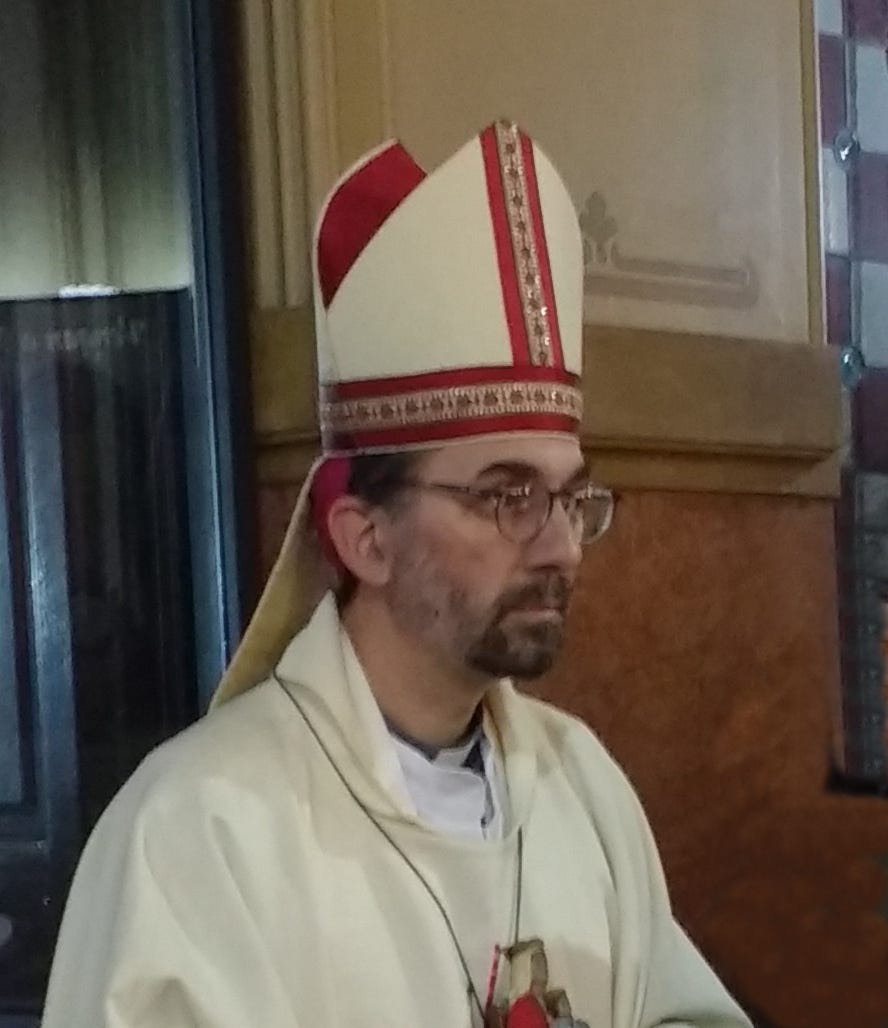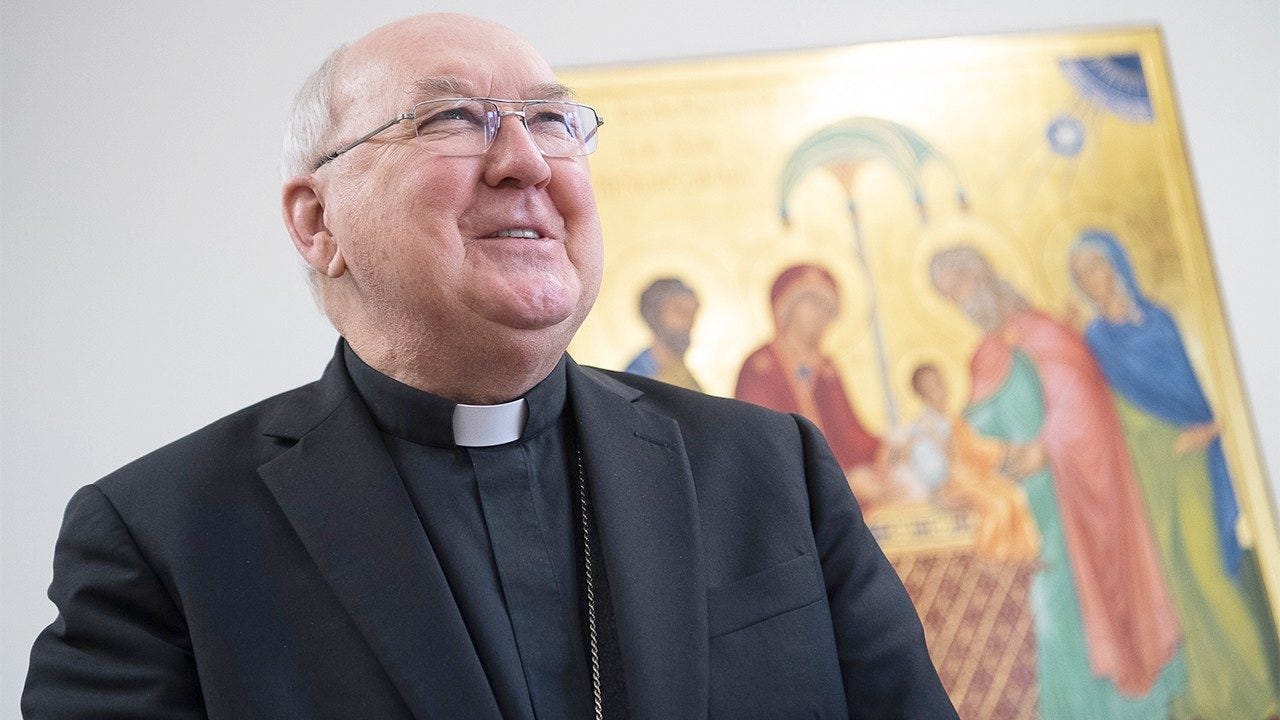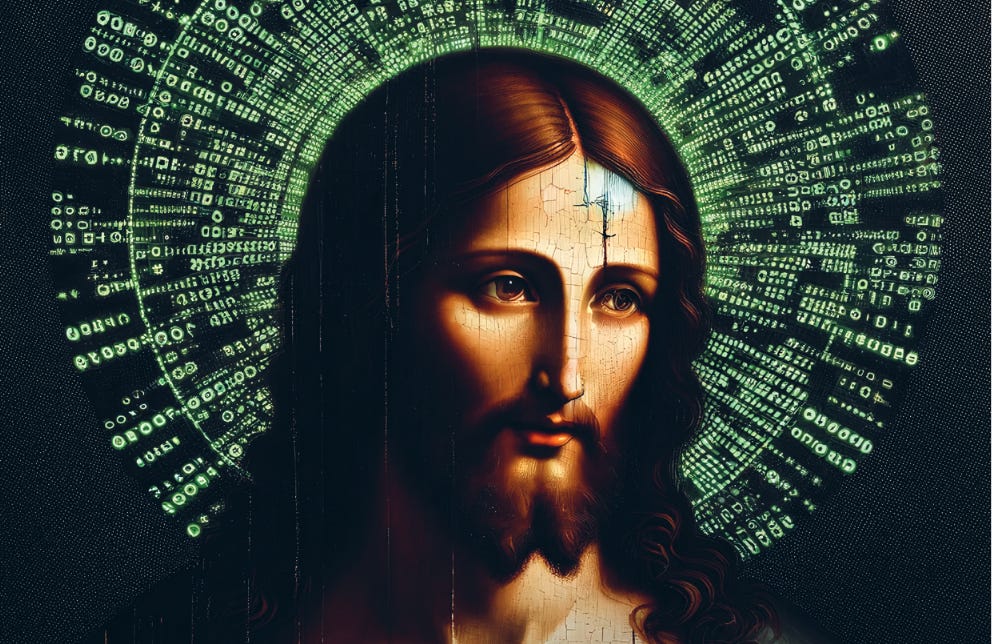Cardinal Blase Cupich of Chicago wrote to Denver Archbishop Samuel Aquila last week to express “a number of concerns,” after Aquila published an essay on theological and pastoral issues concerning the reception of Holy Communion. Cardinal Cupich urged the archbishop to offer a “public clarification” of his arguments.
Aquila’s essay was published in America April 14.
“I am compelled to address the error that any baptized Catholic can receive Communion if he or she simply desires to do so. None of us have the freedom to approach the altar of the Lord without a proper examination of conscience and proper repentance if grave sin has been committed,” Aquila wrote.
“The Eucharist is a gift, not an entitlement, and the sanctity of that gift is only diminished by unworthy reception. Because of the public scandal caused, this is especially true in the case of public officials who persistently govern in violation of the natural law, particularly the pre-eminent issues of abortion and euthanasia, the taking of innocent life, as well as other actions that fail to uphold the church's teaching regarding the dignity of life,” the archbishop continued.
Several sources, among them a senior official in one U.S. archdiocese, told The Pillar this week that shortly after the essay was published, Cupich wrote to Aquila, taking issue with that argument.
The cardinal’s letter to Aquila — which has been seen by The Pillar — was dated April 14, the same day Aquila’s essay was published. The letter said that Cupich had “a number of concerns” with Aquila’s essay, and was especially concerned about the paragraph quoted above.
“I respectfully note that to claim that we can do anything to diminish the Eucharist, or its effects, is contrary to the church’s longstanding teaching,” Cupich wrote.
“Catholic sacramental theology is based on the premise that the sacraments are the work of Christ, which is the meaning of the Church’s affirmation at Trent (DS 1608) that the sacraments act ex opere operato, or, as St. Thomas wrote in the Summa, III, 68,8: ‘The sacrament is not wrought by the righteousness of either the celebrant or the recipient, but by the power of God.’ Owing to the nature of God, Christ and his works can never be diminished by any act on our part.”
“I write as a brother bishop with the suggestion that you consider offering a public clarification of your point,” the cardinal added.
The Pillar was unable to confirm whether Aquila responded directly to Cupich. But in a second essay, published April 18 at Catholic World Report, Aquila offered a public clarification, of sorts.
While he did not identify the bishop who wrote to him, Aquila wrote that a bishop had expressed concern about his essay and had asked for a clarification.
“Because of the confusion I may have caused, I promised the bishop that I would make a public clarification,” Aquila wrote. His essay proceeded to offer a thorough explanation of his view, which the archbishop called an “amplification of the point” he had previously made.
Aquila’s April 18 essay affirmed that sacraments make available grace ex opere operato — the point Cupich raised in his letter. But the archbishop wrote that he also affirms another principle of sacramental theology, namely that “right faith” is necessary for a person “to reap properly the salvific benefits of the sacrament.”
The archbishop cited St. Thomas Aquinas, St. Augustine, Scripture, and the Second Vatican Council to argue that Catholic doctrine teaches that “the unworthy reception of the Eucharist diminishes the effect of the sacrament.”
“The benefit of receiving the sacrament is dependent upon the condition of the subject’s spiritual disposition,” Aquila explained in his essay.
“As I said at the onset, I take seriously my obligation, lest I be condemned, to proclaim clearly, fully and coherently what the Church believes and teaches, for only then am I feeding the faithful under my care the fullness of the Gospel of Jesus Christ,” the archbishop added.
“I hope that in the above, I have clarified the intent and content of my original article. My deepest prayer is, both in my original article and now in this clarification, that this can be a moment when our Catholic faith can be proclaimed clearly and courageously, and people will come to encounter Jesus Christ most especially in the sacraments of the Church, and in the gift of the Eucharist,” he wrote.
The theological disagreement comes as the doctrinal committee of the U.S. bishops’ conference is reportedly preparing a text to address the issue of “Eucharistic coherence,” its term for questions related to the reception of the Holy Communion by pro-abortion politicians and other Catholics publicly and consistently at odds with some aspect of Catholic doctrine.
The bishops are expected at their upcoming virtual meeting in June to take an initial vote on whether to publish such a document; they would vote subsequently on a completed text.
The letter from Cupich to Aquila was dated April 14, the same date Aquila’s essay in America was published.
A spokesman for Aquila declined comment on the letter itself, the date on which Cupich’s letter was received by the archbishop, and whether Aquila had sent any direct response to the cardinal. The spokesman told The Pillar that Archbishop Aquila was away from the chancery attending the archdiocesan priests’ convocation and was unavailable for comment.
The Pillar asked a spokesman for Cupich Wednesday for clarification on the other concerns mentioned in the cardinal’s letter, and whether Aquila’s “clarification” essay had satisfied the cardinal’s theological objections to Aquila’s America essay.
The Pillar also asked whether the letter had actually been sent on the day it was dated, the same as the publication of Aquila’s essay, and if the cardinal had obtained a copy of Aquila’s essay before it was published.
The Archdiocese of Chicago did not respond to The Pillar’s request for comment.
Aquila’s original essay in America was published in conjunction with a second essay on the subject of Eucharistic coherence, which was published on the same day. That article was written by Fr. Louis J. Cameli, a priest of the Archdiocese of Chicago and Cardinal Cupich’s delegate for formation and mission.
Fr. Cameli argued that, in cases touching canon 915 of the Code of Canon Law, which bars reception of Communion by those obstinately persevering in manifest grave sin, the minister of the sacrament must judge if the person “is indeed in manifest or evidently grave sin—that is, an objective situation of sin.”
“Are two people in a same-sex marriage or union in an objectively sinful situation? Not necessarily,” concluded Cameli, despite a recent clarification from the Congregation for the Doctrine of the Faith on the subject.
The Pillar asked America if an advance copy of Aquila’s essay had been given to the Archdiocese of Chicago. America’s editor told The Pillar that the magazine has a policy not to comment on its internal decision-making and practices.
Cardinal Cupich has, since the McCarrick scandal of 2018, emerged as a leading voice among the bishops of the United States, intervening publicly and privately to voice concerns with positions taken by other bishops over issues of Catholic teaching.
In January, The Pillar reported that Cardinal Cupich sought the intervention of the Vatican Secretariat of State to prevent the publication of an Inaguration Day statement from conference president Archbishop Jose Gomez, which took uncompromising positions on the issues of abortion, gender, and religious liberty, and warning that the Biden administration’s policy agenda would advance “moral evils” on several fronts. That statement was delayed but eventually released in full.




